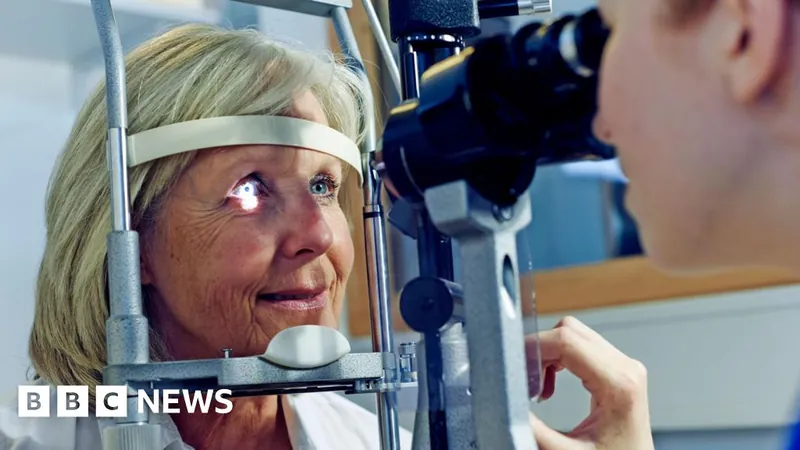
Revolutionary AI Eye Tests Could be Key to Early Dementia Detection!
2025-01-21
Author: Daniel
Introduction
Scottish researchers are on the brink of a groundbreaking advancement that could change the way dementia is diagnosed. This innovative AI tool is set to be utilized by opticians on high streets across the UK, enabling them to identify early signs of dementia through routine eye tests.
AI and Retinal Images
Recent insights into retinal images—photos taken of the eye's interior—have revealed a fascinating link to brain health. The NeurEYE research team is leveraging artificial intelligence to analyze nearly one million eye scans collected from opticians throughout Scotland, making this the largest database of its kind in the world. With this extensive data, scientists have developed a sophisticated algorithm capable of evaluating the condition of blood vessels in the eye, which may provide clues about neurodegenerative conditions, including dementia.
The Role of Retina in Health Detection
Remarkably, the tiny blood vessels in the retina can expose health issues earlier than tests conducted on other parts of the body. Using this technology during standard eye exams, clinicians may soon identify and prevent diseases long before they manifest in the patients' behavior or cognitive abilities.
Research Leadership
Leading the NeurEYE project is the University of Edinburgh, in partnership with Glasgow Caledonian University. Professor Baljean Dhillon, a prominent figure in clinical ophthalmology and co-lead of the NeurEYE initiative, expressed excitement over the findings. “The eye can tell us far more than we thought possible,” he said, highlighting that a simple retina photograph could be pivotal in predicting future brain conditions.
Dementia Statistics
Dementia is an escalating concern, affecting one in 14 individuals over the age of 65 and one in six over 80, as noted by Dementia UK. Alzheimer's disease, a common form of dementia, leads to severe memory loss and confusion, making early diagnosis critical. Although there is currently no cure for dementia, identifying it early can significantly enhance treatment opportunities and facilitate necessary adjustments for both patients and their families.
Personal Testimonies
Personal testimonies reflect the dire need for such advancements. David Steele, a retired mechanical engineer whose mother suffered from Alzheimer’s, shared his heartbreak over the delayed diagnosis. Initially misdiagnosed with macular degeneration, his family later discovered the underlying issue was cerebral blindness related to Alzheimer's. “An earlier diagnosis would have filled a huge gap and allowed us to plan better,” he stated, emphasizing the ripple effect an early detection would have had on his family.
Importance of Regular Eye Tests
Specialist optometrist Ian Cameron from Edinburgh echoed the importance of regular eye tests. He explained, “The eye is unique—it’s a window to the whole body. We can detect various systemic issues, including cardiovascular problems and even some neurological conditions, through eye examinations.” He urged the public to maintain eye health by getting tested every two years, advocating that early detection can lead to improved overall health outcomes.
Future Implementation of NeurEYE
The NeurEYE team aims to have a working prototype ready by the end of this year, with plans for broader implementation across optician practices by 2026. As we stand on the brink of this technological breakthrough, it’s clear that a simple eye test could become a critical tool in the fight against dementia—saving countless families from years of uncertainty and distress.
Conclusion
Could this be the future of healthcare? Stay tuned as we continue to follow this promising development!




 Brasil (PT)
Brasil (PT)
 Canada (EN)
Canada (EN)
 Chile (ES)
Chile (ES)
 Česko (CS)
Česko (CS)
 대한민국 (KO)
대한민국 (KO)
 España (ES)
España (ES)
 France (FR)
France (FR)
 Hong Kong (EN)
Hong Kong (EN)
 Italia (IT)
Italia (IT)
 日本 (JA)
日本 (JA)
 Magyarország (HU)
Magyarország (HU)
 Norge (NO)
Norge (NO)
 Polska (PL)
Polska (PL)
 Schweiz (DE)
Schweiz (DE)
 Singapore (EN)
Singapore (EN)
 Sverige (SV)
Sverige (SV)
 Suomi (FI)
Suomi (FI)
 Türkiye (TR)
Türkiye (TR)
 الإمارات العربية المتحدة (AR)
الإمارات العربية المتحدة (AR)